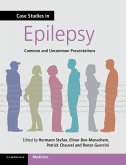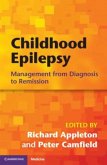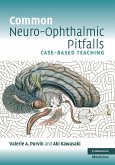- Broschiertes Buch
- Merkliste
- Auf die Merkliste
- Bewerten Bewerten
- Teilen
- Produkt teilen
- Produkterinnerung
- Produkterinnerung
This book looks at why children with epilepsy often have language and behavior complications and assesses treatments.
Andere Kunden interessierten sich auch für
![Childhood Epilepsy Childhood Epilepsy]() William B. SvobodaChildhood Epilepsy217,99 €
William B. SvobodaChildhood Epilepsy217,99 €![Techniques in Epilepsy Surgery Techniques in Epilepsy Surgery]() André OlivierTechniques in Epilepsy Surgery203,99 €
André OlivierTechniques in Epilepsy Surgery203,99 €![Case Studies in Epilepsy Case Studies in Epilepsy]() Case Studies in Epilepsy77,99 €
Case Studies in Epilepsy77,99 €![Childhood Epilepsy Childhood Epilepsy]() Childhood Epilepsy70,99 €
Childhood Epilepsy70,99 €![The Circuitry of the Human Spinal Cord The Circuitry of the Human Spinal Cord]() Emmanuel Pierrot-DeseillignyThe Circuitry of the Human Spinal Cord174,99 €
Emmanuel Pierrot-DeseillignyThe Circuitry of the Human Spinal Cord174,99 €![Common Neuro-Ophthalmic Pitfalls Common Neuro-Ophthalmic Pitfalls]() Valerie A. PurvinCommon Neuro-Ophthalmic Pitfalls139,99 €
Valerie A. PurvinCommon Neuro-Ophthalmic Pitfalls139,99 €![The Frontal Lobes The Frontal Lobes]() Jarl Risberg / Jordan Grafman (eds.)The Frontal Lobes107,99 €
Jarl Risberg / Jordan Grafman (eds.)The Frontal Lobes107,99 €-
-
-
This book looks at why children with epilepsy often have language and behavior complications and assesses treatments.
Hinweis: Dieser Artikel kann nur an eine deutsche Lieferadresse ausgeliefert werden.
Hinweis: Dieser Artikel kann nur an eine deutsche Lieferadresse ausgeliefert werden.
Produktdetails
- Produktdetails
- Verlag: Cambridge University Press
- Seitenzahl: 674
- Erscheinungstermin: 30. Juni 2010
- Englisch
- Abmessung: 244mm x 170mm x 36mm
- Gewicht: 1143g
- ISBN-13: 9780521530293
- ISBN-10: 0521530296
- Artikelnr.: 31187754
- Herstellerkennzeichnung
- Libri GmbH
- Europaallee 1
- 36244 Bad Hersfeld
- gpsr@libri.de
- Verlag: Cambridge University Press
- Seitenzahl: 674
- Erscheinungstermin: 30. Juni 2010
- Englisch
- Abmessung: 244mm x 170mm x 36mm
- Gewicht: 1143g
- ISBN-13: 9780521530293
- ISBN-10: 0521530296
- Artikelnr.: 31187754
- Herstellerkennzeichnung
- Libri GmbH
- Europaallee 1
- 36244 Bad Hersfeld
- gpsr@libri.de
Preface
Glossary
1. Looking ahead
Part I. Speech and Language Problems: 2. Language: the challenge
3. Speech, language, and communication
4. Speech and language problems in epilepsy
5. Seizure types and speech and language risks
6. Language regressions with epilepsy syndromes
7. Other epilepsy language syndromes
8. Seizure-management effects
9. Evaluation of speech and language problems
10. Management of speech and language problems in epilepsy
11. Behavior consequences
Part II. Learning Problems: 12. Learning challenges
13. The development of learning
14. Learning difficulties
15. Learning problems with seizure types
16. Modifying factors
17. Transient cognitive impairments of epilepsy
18. Attention and alertness
19. Memory
20. Executive functioning
21. Academics
22. Antiepileptic medication effects
23. Effects of other therapies
24. Diagnosis
25. Gaining help
26. Frustrations of learning problems
Part III. Behavior Problems: 27. Mental health needs
28. Psychologic development
29. Seizure types and modifying factors
30. Overview: extrinsic factors
31. Behavior problems: general
32. Attention deficit disorders
33. Anxiety disorders
34. Mood disorders
35. Disruptive behavior problems
36. Psychoses of epilepsy
37. Non-epileptic events
38. Possible treatment issues
39. Helping with psychiatric problems
Epilogue
Index.
Glossary
1. Looking ahead
Part I. Speech and Language Problems: 2. Language: the challenge
3. Speech, language, and communication
4. Speech and language problems in epilepsy
5. Seizure types and speech and language risks
6. Language regressions with epilepsy syndromes
7. Other epilepsy language syndromes
8. Seizure-management effects
9. Evaluation of speech and language problems
10. Management of speech and language problems in epilepsy
11. Behavior consequences
Part II. Learning Problems: 12. Learning challenges
13. The development of learning
14. Learning difficulties
15. Learning problems with seizure types
16. Modifying factors
17. Transient cognitive impairments of epilepsy
18. Attention and alertness
19. Memory
20. Executive functioning
21. Academics
22. Antiepileptic medication effects
23. Effects of other therapies
24. Diagnosis
25. Gaining help
26. Frustrations of learning problems
Part III. Behavior Problems: 27. Mental health needs
28. Psychologic development
29. Seizure types and modifying factors
30. Overview: extrinsic factors
31. Behavior problems: general
32. Attention deficit disorders
33. Anxiety disorders
34. Mood disorders
35. Disruptive behavior problems
36. Psychoses of epilepsy
37. Non-epileptic events
38. Possible treatment issues
39. Helping with psychiatric problems
Epilogue
Index.
Preface
Glossary
1. Looking ahead
Part I. Speech and Language Problems: 2. Language: the challenge
3. Speech, language, and communication
4. Speech and language problems in epilepsy
5. Seizure types and speech and language risks
6. Language regressions with epilepsy syndromes
7. Other epilepsy language syndromes
8. Seizure-management effects
9. Evaluation of speech and language problems
10. Management of speech and language problems in epilepsy
11. Behavior consequences
Part II. Learning Problems: 12. Learning challenges
13. The development of learning
14. Learning difficulties
15. Learning problems with seizure types
16. Modifying factors
17. Transient cognitive impairments of epilepsy
18. Attention and alertness
19. Memory
20. Executive functioning
21. Academics
22. Antiepileptic medication effects
23. Effects of other therapies
24. Diagnosis
25. Gaining help
26. Frustrations of learning problems
Part III. Behavior Problems: 27. Mental health needs
28. Psychologic development
29. Seizure types and modifying factors
30. Overview: extrinsic factors
31. Behavior problems: general
32. Attention deficit disorders
33. Anxiety disorders
34. Mood disorders
35. Disruptive behavior problems
36. Psychoses of epilepsy
37. Non-epileptic events
38. Possible treatment issues
39. Helping with psychiatric problems
Epilogue
Index.
Glossary
1. Looking ahead
Part I. Speech and Language Problems: 2. Language: the challenge
3. Speech, language, and communication
4. Speech and language problems in epilepsy
5. Seizure types and speech and language risks
6. Language regressions with epilepsy syndromes
7. Other epilepsy language syndromes
8. Seizure-management effects
9. Evaluation of speech and language problems
10. Management of speech and language problems in epilepsy
11. Behavior consequences
Part II. Learning Problems: 12. Learning challenges
13. The development of learning
14. Learning difficulties
15. Learning problems with seizure types
16. Modifying factors
17. Transient cognitive impairments of epilepsy
18. Attention and alertness
19. Memory
20. Executive functioning
21. Academics
22. Antiepileptic medication effects
23. Effects of other therapies
24. Diagnosis
25. Gaining help
26. Frustrations of learning problems
Part III. Behavior Problems: 27. Mental health needs
28. Psychologic development
29. Seizure types and modifying factors
30. Overview: extrinsic factors
31. Behavior problems: general
32. Attention deficit disorders
33. Anxiety disorders
34. Mood disorders
35. Disruptive behavior problems
36. Psychoses of epilepsy
37. Non-epileptic events
38. Possible treatment issues
39. Helping with psychiatric problems
Epilogue
Index.








